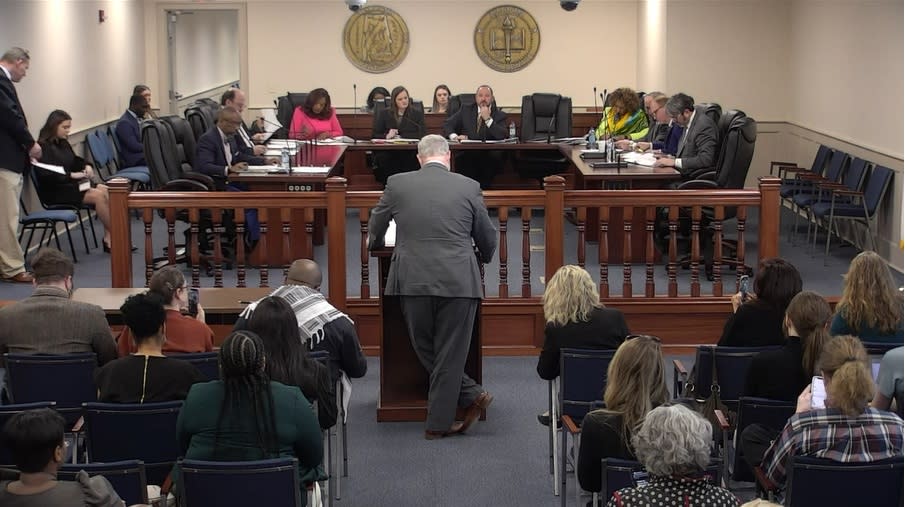Alabama Senate’s local government committee gets controversial statewide bills

Sen. Will Barfoot, R-Pike Road (at podium) speaks on a bill that would ban the teaching of "divisive concepts" and publicly-funded diversity, equity and inclusion programs at a meeting of the Senate County and Municipal Government Committee on Feb. 21 2024 in Montgomery, Alabama. (Alabama Statehouse livestream)
Alabama’s 2024 legislative session has been frontloaded with several controversial bills.
And in the Senate, they seem to be going through one committee.
The Senate County and Municipal Government Committee has taken on legislation that would radically reorganize the governing board of the Alabama Department of Archives and History. It voted out a bill that would subject public employees who teach so-called “divisive concepts” or run Diversity, Equity and Inclusion (DEI) programs to discipline or termination.
GET THE MORNING HEADLINES DELIVERED TO YOUR INBOX
Both pieces of legislation appear to be outside the official description of the committee. The Alabama Senate rules say County and Municipal Government may consider any legislation “concerning the organization, operation, and government of any incorporated municipality in the State of Alabama and matters relating to the organization, operation, and government of counties in Alabama.”
The Alabama Department of Archives and History is a state agency, and the “divisive concepts” and anti-DEI legislation chiefly concern public K-12 schools and colleges. On the Alabama Legislature website, the subject matter for both bills is listed as “State & State Officials.”
Sen. Chris Elliott, R-Josephine, the chair of the committee, criticized Archives last June for hosting a program on LGBTQ+ history, and filed a bill in last summer’s special session to strip $5 million from the department. That bill did not become law. Elliott sponsored the bill to change the governance of Archives.
Multiple messages were left with Elliott, who confirmed in-person last week that he had seen the first message. Elliott declined comment multiple times when asked in-person.
Sen Chris Elliott, R-Josephine, speaks to a colleague on the floor of the Alabama Senate at the Alabama Statehouse on Feb. 20, 2024 in Montgomery, Alabama. (Brian Lyman/Alabama Reflector)
In its original form, Elliott’s bill would have fired the board of trustees of Archives on June 1. The bill was first assigned to the State Government Committee. When it did not pass out of committee the first day it was there, Elliott filed a new version that went to the County and Municipal Government Committee.
In the House, it was assigned to the Boards, Agencies and Commissions Committee.
The divisive concepts and DEI bill was assigned to the State Government Committee in the House of Representatives.
“It made me kind of ask the internal question of why,” said Sen. Merika Coleman, D-Pleasant Grove, who also questioned the destination of the bills on the floor of the Senate chamber.
Coleman said that this is not the first time she’s been confused by committee assignments since coming to the Senate from the House of Representatives.
‘You could say everything is applicable to county and municipal government’
Senate President Pro Tem Greg Reed, R-Jasper, listens to a presentation for Baltimore Orioles shortstop Gunnar Henderson on the floor of the Alabama Senate on Feb. 8, 2024 in Montgomery, Alabama. (Brian Lyman/Alabama Reflector)
Asked about how committee assignments were made after Coleman spoke on the Senate floor, Senate President Pro Tempore Greg Reed, R-Jasper, said that government committees could encompass a lot.
“A lot of times the government committees, the County and Municipal Government or the State Government Committee are kind of committees that catch a lot of issues that really, you could say everything is applicable to county and municipal government or state government, everything we work on,” he said. “We have different committees for that reason, but I think there’s been a lot of these issues that have gone to those committees, just because they were related to that particular committee.”
According to Rule 23 of the Senate Rules, “Every Senate bill on first reading shall be referred to a standing committee by the presiding officer, or his/her designee, subject to Rule 54,” a rule which governs bills on appropriations.
Lt. Gov. Will Ainsworth presides over the Senate. A message seeking comment was left with Jesse Skaggs, Ainsworth’s chief of staff.
‘The pain in folks’ eyes’
Sen. Kirk Hatcher, D-Montgomery, listens to a speaker in the Alabama Senate on Feb. 8, 2024 in Montgomery, Alabama. (Brian Lyman/Alabama Reflector)
The controversial nature of the bills have taken their toll on legislators. Sen. Kirk Hatcher, D-Montgomery, openly discussed the possibility of resigning at a committee meeting on the “divisive concepts” bill on Feb. 21, saying he was tired and that he felt he was fighting battles that his mother had fought.
Hatcher spoke at length about his concerns on the Senate floor on Thursday.
“Over these last 12 days, the pain in folks’ eyes has made it almost unbearable for me,” he said.
In his speech, he mentioned the chair of the County and Municipal Government Committee by name.
“It appears Chris Elliott that you are stuck with me,” said Hatcher.
A message was left with Hatcher Friday.
Coleman said that, in contrast to past years, some of the more controversial bills are moving at the beginning rather than the end of the session.
“The way it normally would work is we have some feel-good bills at the beginning of the session, so we can all kind of Kumbaya get closer to the mid and the end, and then when we’re getting ready to go home, have the more divisive pieces of legislation,” she said.
Sen. Merika Coleman, D-Pleasant Grove, listens to debate in the Alabama Senate on a bill to extend immunity to in vitro fertilization programs on Feb. 29, 2024 at the Alabama Statehouse in Montgomery, Alabama. (Brian Lyman/Alabama Reflector)
She said it’s been difficult for the Democrats in the Senate because the three Democrats who serve on the committee have been hearing all of the bills, rather than having them spread out among the caucus. She said they usually talk amongst themselves and prepare other members, but it’s been the same three members all year.
The senator was able to pass legislation in 2020 that eventually led to the removal of racist language from the state Constitution. But she said she was not sure she could pass that bill today.
“I’m on television saying that ‘Hey, we want to prove to the world that we are a 21st century Alabama. We are not the Alabama that you see on television when they depict the South. That’s not who we are,’” she said. “But we’re proving right now that’s exactly who we are.”
The post Alabama Senate’s local government committee gets controversial statewide bills appeared first on Alabama Reflector.





